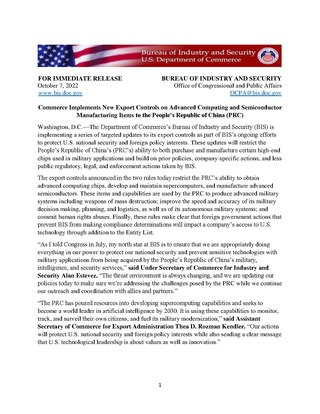
Huawei Technologies Co., Ltd. is a Chinese multinational technology corporation headquartered in Shenzhen, Guangdong, China. It designs, develops, produces and sells telecommunications equipment, consumer electronics and various smart devices.

The military budget is the largest portion of the discretionary United States federal budget allocated to the Department of Defense, or more broadly, the portion of the budget that goes to any military-related expenditures. The military budget pays the salaries, training, and health care of uniformed and civilian personnel, maintains arms, equipment and facilities, funds operations, and develops and buys new items. The budget funds five branches of the U.S. military: the Army, Navy, Marine Corps, Air Force, and Space Force.

ZTE Corporation is a Chinese partially state-owned technology company that specializes in telecommunication. Founded in 1985, ZTE is listed on both the Hong Kong and Shenzhen Stock Exchanges.
The National Defense Authorization Act (NDAA) is the name for each of a series of United States federal laws specifying the annual budget and expenditures of the U.S. Department of Defense. The first NDAA was passed in 1961. The U.S. Congress oversees the defense budget primarily through two yearly bills: the National Defense Authorization Act and defense appropriations bills. The authorization bill is the jurisdiction of the Senate Armed Services Committee and House Armed Services Committee and determines the agencies responsible for defense, establishes recommended funding levels, and sets the policies under which money will be spent. The appropriations bill provides funds.
The National Defense Authorization Act (NDAA) for Fiscal Year 2012 is a United States federal law which among other things specifies the budget and expenditures of the United States Department of Defense. The bill passed the U.S. House on December 14, 2011, the U.S. Senate on December 15, 2011, and was signed into United States law on December 31, 2011, by President Barack Obama.
The National Defense Authorization Act (NDAA) for Fiscal Year 2013 is a United States federal law which specifies the budget and expenditures of the United States Department of Defense for fiscal year 2013. The full title is An Act to Authorize Appropriations for fiscal year 2013 for military activities of the Department of Defense, for military construction, and for defense activities of the Department of Energy, to prescribe military personnel strengths for such fiscal year, and for other purposes. This law has been assigned the number PL 112–239.

Hytera is a Chinese publicly-traded and partly state-owned manufacturer of radio transceivers and radio systems founded in Shenzhen, Guangdong in 1993. Hytera is listed on the Shenzhen Stock Exchange and is partly owned by Shenzhen Investment Holdings of Shenzhen's municipal government. Hytera is major contributor to the PDT Standard, which is designed for public safety organizations in China. The company is a major supplier to China's Ministry of Public Security.

The National Defense Authorization Act for Fiscal Year 2014 is a United States federal law which specifies the budget and expenditures of the United States Department of Defense (DOD) for Fiscal Year 2014. The law authorizes the DOD to spend $607 billion in Fiscal Year 2014.

Zhejiang Dahua Technology Co., Ltd. is a partly state-owned publicly traded company based in Binjiang District, Hangzhou, which manufactures video surveillance equipment. It was founded and controlled by Fu Liquan. Dahua Technology has been listed on the Shenzhen Stock Exchange since its IPO in 2008. The company is a component of multiple indices, including SZSE Component Index, SZSE Composite Index, and SZSE 300 Index.

The National Defense Authorization Act for Fiscal Year 2016 is a United States federal law which specifies the budget and expenditures of the United States Department of Defense (DOD) for Fiscal Year 2016.

The National Defense Authorization Act for Fiscal Year 2018 is a United States federal law which specifies the budget, expenditures and policies of the U.S. Department of Defense (DOD) for Fiscal Year 2018. Analogous NDAAs have been passed in previous and subsequent years.

The chief management officer (CMO) of the United States Department of Defense (DoD) was the third-in-command of the department after the Secretary of Defense and Deputy Secretary of Defense. The position's purpose was to reduce costs by improving the quality and productivity of DoD's business operations. Congress disestablished the CMO position with the passage of the William M. (Mac) Thornberry National Defense Authorization Act for Fiscal Year 2021 effective 1 January 2021.
The Chinese multinational information technology and consumer electronics company Huawei has faced numerous criticisms for various aspects of its operations, particularly in regards to cybersecurity, intellectual property, and human rights violations.
Concerns over Chinese involvement in 5G wireless networks stem from allegations that cellular network equipment sourced from Chinese vendors may contain backdoors enabling surveillance by the Chinese government and Chinese laws, such as the Cybersecurity Law of the People's Republic of China, which compel companies and individuals to assist the state intelligence agency on the collection of information whenever requested. The allegations came against the backdrop of the rising prominence of Chinese telecommunication vendors Huawei and ZTE in the 5G equipment market, and the controversy has led to other countries debating whether Chinese vendors should be allowed to participate in 5G deployments.
Biden v. Sierra Club was a United States Supreme Court case involving the appropriation of funds used to expand the Mexico–United States barrier under the presidency of Donald Trump, colloquially known as the Trump wall. Congress did not grant direct appropriations to fund expansion of the wall, leading Trump to sign the National Emergency Concerning the Southern Border of the United States in February 2019 which, citing his powers under the National Emergency Act, took approximately US$8 billion of funds appropriated to military spending towards construction of the wall. Numerous states and non-governmental organizations filed suit shortly after the order, resulting in a Ninth Circuit ruling that deemed the transfer of funds inappropriate under the Appropriations Clause and leading to the Supreme Court challenge.

The National Defense Authorization Act for Fiscal Year 2020 is a United States federal law which specifies the budget, expenditures and policies of the U.S. Department of Defense (DOD) for fiscal year 2020. Analogous NDAAs have been passed in previous and subsequent years. The NAA passed the House by a vote of 377–48 and the Senate by a vote of 86–8 and became effective on December 20, 2019 when it was signed into law by President Donald Trump.

The William M. (Mac) Thornberry National Defense Authorization Act for Fiscal Year 2021 is a United States federal law which specifies the budget, expenditures and policies of the U.S. Department of Defense (DOD) for fiscal year 2021. Analogous NDAAs have been passed annually for 59 years. The act is named in honor of Representative Mac Thornberry, who served as either the chair or the ranking member of the House Armed Services Committee. Thornberry retired from Congress at the end of the congressional session.
The United States government applies sanctions against certain institutions and key members of the Chinese government and its ruling Chinese Communist Party (CCP), certain companies linked to the People's Liberation Army (PLA), and other affiliates that the US government has accused of aiding in human rights abuses. The US maintained embargoes against China from the inception of the People's Republic of China in 1949 until 1972. An embargo was reimposed by the US following the 1989 Tiananmen Square protests and massacre. From 2020 onward, the US imposed sanctions and visa restrictions against several Chinese government officials and companies, in response to allegations of a genocide against the Uyghur population in Xinjiang and human rights abuses in Hong Kong and Tibet.

The National Defense Authorization Act for Fiscal Year 2022 is a United States federal law which specifies the budget, expenditures and policies of the U.S. Department of Defense (DOD) for fiscal year 2022. Analogous NDAAs have been passed annually for 60 years.

Effective October 7, 2022, the United States of America implemented new export controls targeting the People's Republic of China's (PRC) ability to access and develop advanced computing and semiconductor manufacturing items. The new export controls reflect the United States' ambition to counter the accelerating advancement of China's high-tech capabilities in these spaces to address foreign policy and national security concerns.








